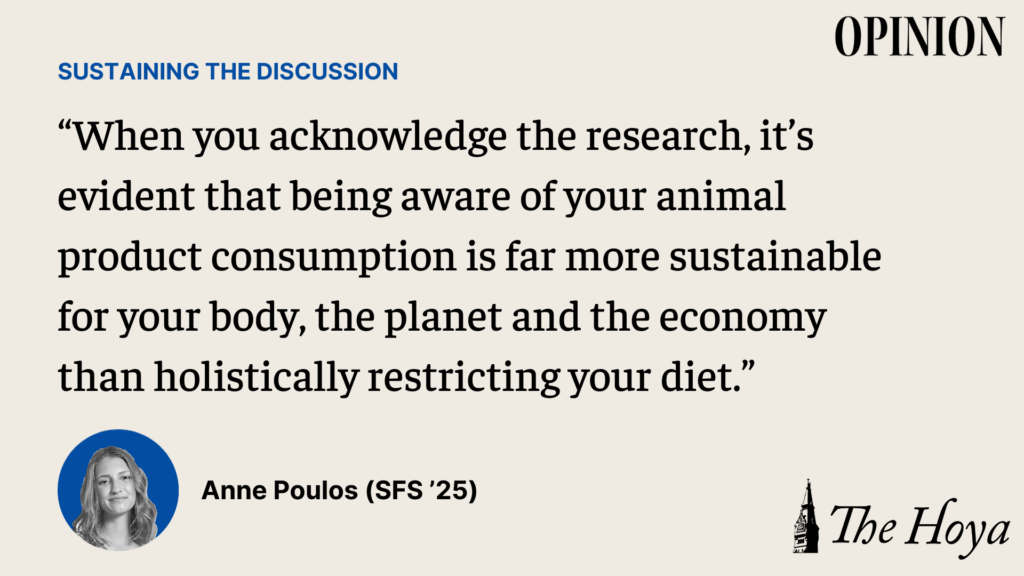In 2016, a cow escaped from a slaughterhouse in New York City. Luckily, Freddie was sent to live happily in a New Jersey sanctuary. Unfortunately for everyone around me, however, Freddie’s story launched my career of fierce but ineffective animal and environmental activism. This was largely in the form of informing the people around me that “meat is murder.”
Five years later, upon an intense discussion with my omnivorous girlfriend, I sat down to conduct some real research on the topic and discovered that my superiority complex, shockingly, was not as cemented in fact as I had thought. In reality, the most environmentally sustainable and morally conscious diet is far more nuanced than simply cutting out meat.
First, I confirmed what I already knew: that vegetarianism and veganism not only save livestock like Freddie, but also preserve the environment and increase industry accountability. Raising and maintaining livestock requires 163 times as much land, uses 18 times as much water and produces 11 times as much carbon dioxide as the same amount of rice or potatoes would use.
The production of vegan substitutes, especially oat alternatives instead of almond or soy products, has immense environmental advantages. There is a 61% discrepancy between the carbon footprints of dairy products and their dairy-free alternatives.
However, meat substitutes do sometimes fall short of our expectations. Although plant-based alternatives to meat produce only 10% the emissions of beef, their environmental impact is still similar to the production of poultry. Production of plant-based meat alternatives will definitely not have as harmful an impact as the meat industry, but it will take its own toll.
Research from the Johns Hopkins Center for a Livable Future has shown that removing meat or dairy from your diet for two-thirds of your daily meals reduces your carbon footprint and water consumption almost as significantly as if you cut meat and dairy out altogether. This partial dietary change would allow for enough of an economic threat to the meat industry to incentivise environmental prioritization without tanking the industry altogether, creating a new consumerism-driven environmental disaster in meat and dairy substitution industries.
Indeed, an important consideration in environmentally conscious choices is the decision’s monetary impact, since economic success is frequently valued above environmental preservation. Meat production is the foundation of many agricultural and working-class communities. Both the farm and factory work that goes into meat production rely heavily on coast-to-coast consumption, and disrupting the demand for these products would have disastrous implications for national economic stability.
In the United States, the macroeconomic and microeconomic repercussions of reducing the national consumption of animal products inhibit the progression of environmental policy. Vegetarian alternatives to meat such as Impossible Burgers or Beyond Burgers have only recently reached a notable production capacity.
Additionally, the price of vegetarian and vegan alternatives is not reasonable for a large number of U.S. residents. In order to consume sufficient nutrients for a healthy diet while relying on meatless products, buyers must purchase more food at a higher price point.
While I would love to believe from atop my vegetarian high horse that I am the savior of Freddie and, by extension, the earth, when you acknowledge the research, it’s evident that being aware of your animal product consumption is far more sustainable for your body, the planet and the economy than holistically restricting your diet.
Anne Poulos is a first-year in the School of Foregn Service. Sustaining the Discussion is published every other week.














